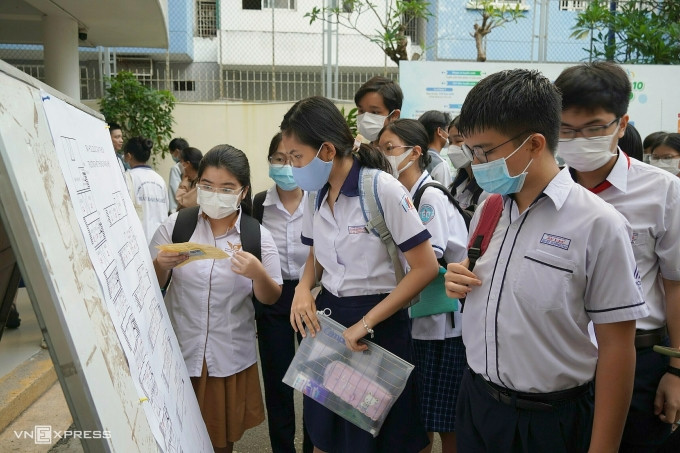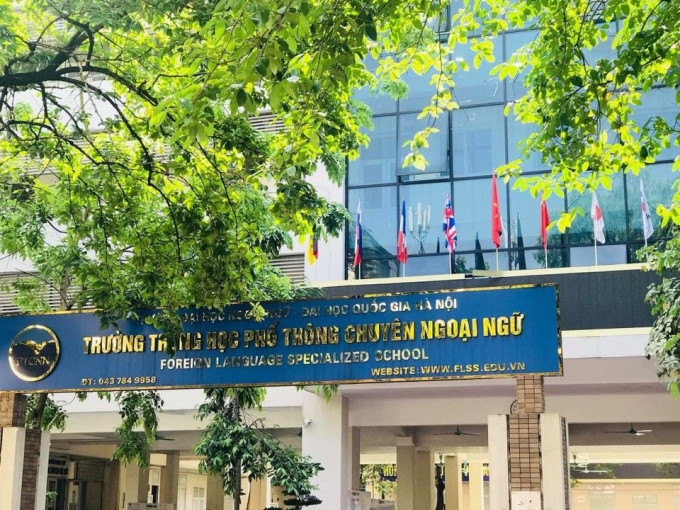Only receiving a budget of 4-6 billion VND per year, the specialized training system was stopped, but the operating cost of nearly 20 billion VND caused the two schools to increase tuition fees 4-5 times higher than present.

In early May, the Foreign Language Specialized High School, Hanoi National University, announced an increase in tuition fees for the new course. Tuition fees are divided into two levels: 1.3 million VND/month in 2024, and from 2025 it will increase to 1.97 million.
Hanoi National University of Education High School for the Gifted also plans to charge tuition of 650,000 VND per month in the first semester, and 1.6 million VND in the second semester. In the next two years, tuition will be 1.7 and 1.8 million VND per month, respectively.
Currently, both schools apply the fee of 300,000 VND for specialized students.
"Specialized high schools affiliated with universities are facing the problem of whether they can survive or not if tuition fees are not increased," said Dr. Nguyen Phu Chien, principal of the Foreign Language Specialized High School.
There are 8 specialized high schools nationwide that have announced enrollment for the new school year. They are Natural Sciences, Social Sciences and Humanities, Foreign Languages (Hanoi National University); Hanoi Pedagogical University; Vinh University; Hue Science (Hue University); Gifted High School; Gifted High School (Tan Tao University, Long An).
Of these, three schools announced tuition increases and all of them are the Foreign Language School, Pedagogy School, and Gifted High School. According to school leaders, there are two main reasons for this.
The first is the trend of autonomy. Autonomous universities will have their state budget reduced, so the amount of funding for specialized high schools under their management will also be less. This is the biggest difference between these schools and specialized schools under the Department of Education and Training - which are subsidized by the People's Committees of provinces and cities.
The second reason is that from the 2024-2025 school year, according to the request of the Ministry of Education and Training, specialized high schools must stop recruiting non-specialized classes. Currently, the tuition fees for this system in Pedagogy and Foreign Language majors are 1.8-3.1 million VND/month, respectively, which is 6-10 times higher than the specialized system.
"Since opening the non-specialized system in 2012, we have used revenue from this system to compensate for the specialized system, especially in terms of scholarships and talent training," said Dr. Vu Van Tien, principal of Hanoi National University of Education's High School for the Gifted. "When the budget decreased and revenue from the non-specialized system was no longer available, we were forced to increase tuition fees to maintain operations."
More specifically, Mr. Tien said that for many years, the school has been granted 4.8 billion VND per year, this year it has increased to 6 billion, but the total expenditure is up to 20-24 billion VND. The largest amount is 11 billion to pay salaries for 66 teachers and staff, more than 50 contract employees and guest lecturers.
Similarly, principal Nguyen Phu Chien said that the Foreign Language School receives a budget of about 6 billion VND a year, which has recently decreased a lot, but the total cost of salaries, insurance... for 91 teachers is more than 18 billion.
To set new tuition fees, schools must convert their model from public to self-financed public, have their quality inspected by the Department of Education and Training, and then collect tuition fees according to Decree 81 of 2021 of the Government.
Accordingly, the tuition ceiling for urban high school students is 650,000 VND/month. Autonomous public schools can charge double this amount, or 1.3 million VND. If they pass quality accreditation, schools can determine their own tuition fees.
In addition, the Foreign Language and Pedagogy Specialized School consults the service prices of Hanoi - where the school is located. Currently, the service price ceiling for specialized high schools under the management of Hanoi is about 2.8 million VND/month.
Even with the new tuition fees, the two schools are still not well-off, but operating at a minimal level, according to the principals. For example, the Foreign Language Specialized High School still has to ask the Foreign Language University for an additional 30% support, while Hanoi Pedagogical University does not have the money to make up for the deficit of the specialized school.

In Ho Chi Minh City, the Gifted High School increased its tuition two years ago, when it began to be autonomous. Next school year, the school will collect 1.5-2.6 million VND/month, including boarding fees, an increase of about 7.5% compared to the present.
Professor Nguyen Thi Thanh Mai, principal, said that in principle, the school can charge higher tuition fees. However, the purpose of the specialized school is to train and develop talents, so if tuition fees are increased to cover training costs, disadvantaged students will face barriers.
In the long term, according to Ms. Mai, university-affiliated high schools must be partially autonomous, in addition to the support of their parent schools, to improve training quality and create more activities, playgrounds, and services for students.
This is also the wish of Mr. Nguyen Duc Son, Principal of Hanoi National University of Education. He said that despite the increase in tuition fees and quotas this year, the specialized high school still faces many difficulties and must propose to the Ministry of Education and Training for support.
Schools said that in addition to increasing tuition fees, they will also spend more on scholarships and improve their curriculum. For example, the Gifted High School will spend 8% of its revenue on scholarships, the Foreign Language School will spend 10% and will not collect additional fees for intensive English or second foreign language classes. Meanwhile, the Pedagogical School plans to increase the rewards for students who win national and international awards.
"We try to gradually improve students' rights, along with the task of nurturing excellent students, but compared to provinces and cities that reward several hundred million VND for international Olympic medals, our level of 10 million, even if increased, is still far behind," said Mr. Tien.
TH (according to VnExpress)